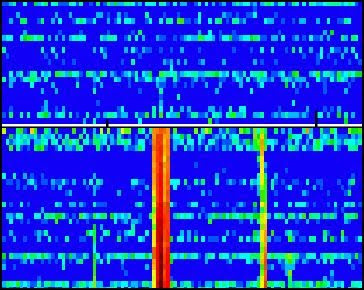 Radio Sky Pipe chart published by Sandro Chinotti, recorded from his Switzerland Radio JOVE Observatory, showing a solar event starting near 1413 UT.
Radio Sky Pipe chart published by Sandro Chinotti, recorded from his Switzerland Radio JOVE Observatory, showing a solar event starting near 1413 UT.

Details of the STEREO WAVES Behind spectrum showing type III bursts near 1413 UT. Pixels are spaced at one minute intervals.
Many thanks to Sandro.
Many thanks to Sandro.






























